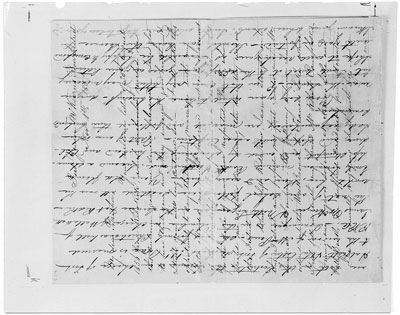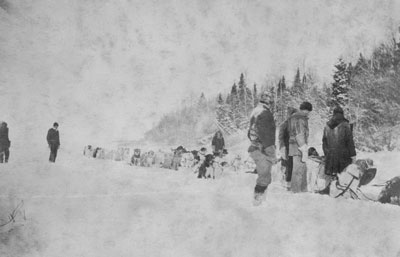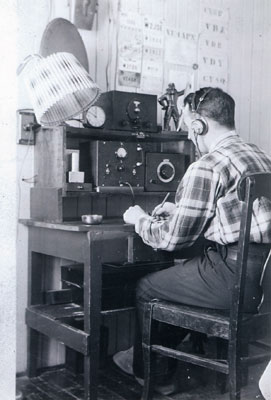Staying in Touch
For many Scots the lengthy separation between themselves and family and friends at home was one of the most difficult challenges of fur trade life. Many servants and officers of the Hudson's Bay Company returned home no more than once or twice, if at all, during their careers, and so relied on colleagues arriving from Scotland to keep them updated with news from their home towns. For those who were literate, writing and receiving letters was the only way of keeping direct contact with wives, parents, siblings and children overseas.

When paper was scarce, correspondents used criss-cross writing, such as in this letter from 1857.
© Glenbow Archives NA-277-1
Many wrote of the challenges they faced just to have their letters reach their destination. Paper was often quite scarce, and all available space had to be used. Letters frequently went missing, and so copies of important mail, especially that relating to Hudson's Bay Company business, had to be kept. Most of all, until the late nineteenth century, correspondence could only be sent or received during the navigational season, when the Company's ships were able to reach the Hudson Bay. Mail that was sent from London in the spring often took many months to arrive, and it was not uncommon for some letters to be sent to men from family back home only to arrive after some accident had befallen the intended recipient.

Dog teams were often used to carry mail between fur trade posts.
© Provincial Archives of Manitoba, William Rackham. N21206.
Writing letters was a way of maintaining bonds between families, and many personal letters note the great pleasure that receiving news of loved ones brought. By the twentieth century, with improvements in transportation in the interior, letters could be sent and received more often and were sometimes accompanied by photographs and small gifts. Men stationed in more remote posts, however, were still only able to send or receive correspondence infrequently; some of their letters which have survived were written over a period of many months and run to dozens of pages.
By the early twentieth century, changes in technology, such as the telegraph, telephone and radio, improved communication tremendously. Radio became especially important following World War Two and was very popular with clerks and managers at Hudson's Bay Company posts. Myron Hampton, who lived with relatives in the northeast of Scotland while he went to school, and whose father, Ernest, worked for the company, sometimes managed to reach his parents with the help of an amateur radio enthusiast who had a radio shack close to Dyce Airport, Aberdeen. Despite the impact of these new technologies, communication by letter remained the most popular way of retaining links with family.



